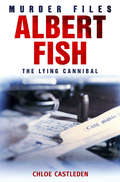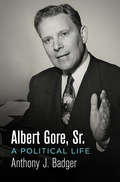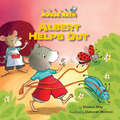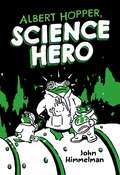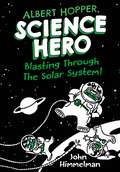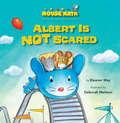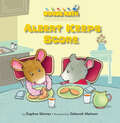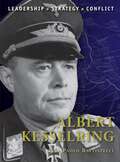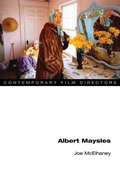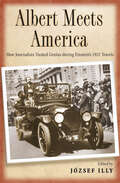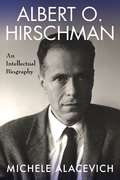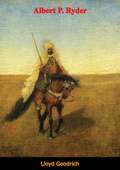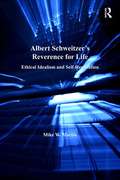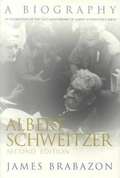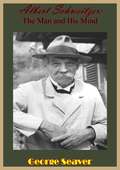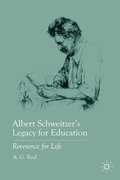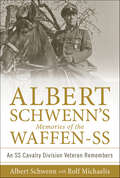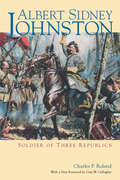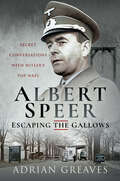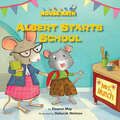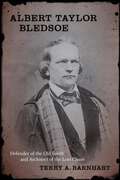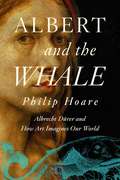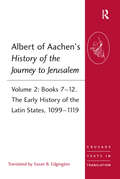- Table View
- List View
Albert Fish: The Lying Cannibal (Murder Files)
by Chloe CastledenIt is still unclear how many children were raped or murdered by Albert Fish, also known as the Gray Man, the Werewolf of Wysteria, the Brooklyn Vampire, and The Boogeyman. He claimed to be responsible for at least 100 such crimes, but many of the details remain unproven. But the indisputable elements of his story are grisly and disturbing, and the story of his eventual capture a fascinating one.The Murder Files is a series of individual titles, giving condensed accounts of some of the most appalling and notorious killers of all time.
Albert Gore, Sr.: A Political Life (Politics and Culture in Modern America)
by Anthony J. BadgerIn chronicling the life and career of Albert Gore, Sr., historian Anthony J. Badger seeks not just to explore the successes and failures of an important political figure who spent more than three decades in the national eye—and whose son would become Vice President of the United States—but also to explain the dramatic changes in the South that led to national political realignment.Born on a small farm in the hills of Tennessee, Gore served in Congress from 1938 to 1970, first in the House of Representatives and then in the Senate. During that time, the United States became a global superpower and the South a two party desegregated region. Gore, whom Badger describes as a policy-oriented liberal, saw the federal government as the answer to the South's problems. He held a resilient faith, according to Badger, in the federal government to regulate wages and prices in World War II, to further social welfare through the New Deal and the Great Society, and to promote economic growth and transform the infrastructure of the South.Gore worked to make Tennessee the "atomic capital" of the nation and to protect the Tennessee Valley Authority, while at the same time cosponsoring legislation to create the national highway system. He was more cautious in his approach to civil rights; though bolder than his moderate Southern peers, he struggled to adjust to the shifting political ground of the 1960s. His career was defined by his relationship with Lyndon Johnson, whose Vietnam policies Gore bitterly opposed. The injection of Christian perspectives into the state's politics ultimately distanced Gore's worldview from that of his constituents. Altogether, Gore's political rise and fall, Badger argues, illuminates the significance of race, religion, and class in the creation of the modern South.
Albert Helps Out: Counting Money (Mouse Math)
by Eleanor MayEach read-aloud book in the Mouse Math series focuses on a single, basic math concept and features adorable mice, Albert and Wanda, who live in a People House. Entertaining fiction stories capture kids&’ imaginations as the mice learn about numbers, shapes, sizes and more. Over 3 million copies sold worldwide!What could be better than a Captain Slime penny? Albert needs two quarters to use the library's new penny-smashing machine. Luckily, Wanda has a great idea for how Albert can earn the money. Every Mouse Math title includes back matter activities that support and extend reading comprehension and math skills, plus free online activities. (Math concept: Counting money)
Albert Hopper, Science Hero (Albert Hopper, Science Hero #1)
by John HimmelmanIn John Himmelman's early chapter book series, Albert Hopper is a frog—and a science hero! He seeks to explore the world and beyond, generating laughs and imparting STEM wisdom as he goes. Albert Hopper, Science Hero is on a mission: to travel to the center of the earth! With his wormlike ship Wiggles and the help of his niece and nephew, trusty Junior Science Heroes Polly and Tad, Hopper is ready to go where no frog has gone before.Thick layers of rock and rubble, tunnels of lava, and temperatures of 6,000 degrees stand between our heroes and their prize. Will they make it? Find out in this funny and informative adventure.
Albert Hopper, Science Hero: Blasting Through the Solar System! (Albert Hopper, Science Hero #2)
by John HimmelmanIn John Himmelman's early chapter book series, Albert Hopper is a frog—and a science hero! He seeks to explore the world and beyond, generating laughs and imparting STEM wisdom as he goes. Science Hero Albert Hopper and trusty Junior Science Heroes Polly and Tad are ready for their next adventure. This time, they're blasting through the solar system!As the heroes float through the sulphuric acid clouds of Venus, dodge the solar flares of the sun, and weather the space storms of Jupiter, their science smarts are put to the test. Anything can happen on this hilarious ride in Albert Hopper, Science Hero: Blasting Through the Solar System.
Albert Is NOT Scared: Direction Words (Mouse Math)
by Eleanor MayEach read-aloud book in the Mouse Math series focuses on a single, basic math concept and features adorable mice, Albert and Wanda, who live in a People House. Entertaining fiction stories capture kids&’ imaginations as the mice learn about numbers, shapes, sizes and more. Over 3 million copies sold worldwide!It&’s Albert&’s first trip to the amousement park. He says he&’s not "afraid" to go on rides—he just doesn&’t like ones that go up and down. Or left and right. Or around and around! But what happens when Albert ends up in line for the wrong ride? Every Mouse Math title includes back matter activities that support and extend reading comprehension and math skills, plus free online activities. (Math concept: Direction Words)
Albert Keeps Score (Mouse Math)
by Daphne SkinnerEach read-aloud book in the Mouse Math series focuses on a single, basic math concept and features adorable mice, Albert and Wanda, who live in a People House. Entertaining fiction stories capture kids&’ imaginations as the mice learn about numbers, shapes, sizes and more. Over 3 million copies sold worldwide!Albert wants to make sure that his big sister, Wanda, never gets more of anything than he does. So he carefully keeps score and discovers that sometimes 0 is better than 1! Every Mouse Math title includes back matter activities that support and extend reading comprehension and math skills, plus free online activities. (Math concept: Comparing Numbers)
Albert Kesselring
by Adam Hook Pier BattistelliAlthough he is mostly remembered for his part in the campaign in Italy from 1943 to 1945, Generalfeldmarschall Albert Kesselring was also chief of staff of the Luftwaffe in 1936-37, playing a crucial role in the shaping of the service for the coming war. As commander of Luftflotte 1 in Poland and Luftflotte 2 in France and the Low Countries, he was responsible for supporting the armoured spearheads of the German Army as they undertook their Blitzkrieg campaigns. With the Fall of France, the Battle of Britain began and Luftlotte 2 was the main force in the air attack against the British air defences, with Kesselring planning many raids. Following the war Kesselring was tried and convicted of war crimes following a number of massacres of civilians in Italy. He was sentenced to death, later commuted to life imprisonment before being released on the grounds of ill health in October 1952. Here Pier Paolo Battistelli provides a detailed study of one of the most famous German commanders of World War II.
Albert Maysles (Contemporary Film Directors)
by Joe McelhaneyAlbert Maysles has created some of the most influential documentaries of the postwar period. Such films as Salesman,Gimme Shelter, and Grey Gardens continue to generate intense debate about the ethics and aesthetics of the documentary form. In this in-depth study, Joe McElhaney offers a novel understanding of the historical relevance of Maysles. By closely focusing on Maysles's expressive use of his camera, particularly in relation to the filming of the human figure, this book situates Maysles's films within not only documentary film history but film history in general, arguing for their broad-ranging importance to both narrative film and documentary cinema. Complete with an engaging interview with Maysles and a detailed comparison of the variant releases of his documentary on the Beatles (What's Happening: The Beatles in the U.S.A. and The Beatles: The First U.S. Visit), this work is a pivotal study of a significant filmmaker.
Albert Meets America: How Journalists Treated Genius during Einstein's 1921 Travels
by József IllyIn 1919, newspaper headlines said that a British expedition had confirmed Einstein's general theory of relativity. The news stirred the public imagination on both sides of the Atlantic and thrust the scientist into the spotlight of fame. Two years later, Chaim Weizmann led a fund-raising mission to the United States and invited Einstein to join it. The mission traveled to New York, Boston, Chicago, Cleveland, Philadelphia, and Hartford to campaign for public awareness and support of the Hebrew University of Jerusalem. This brought Einstein within the grasp of the American media. His lectures delivered in New York, Princeton, and Chicago, and comments on the Jewish presence in Palestine, made Einstein, on his first trip to America, one of the first media stars. In Albert Meets America, József Illy presents a fascinating compilation of media stories of Einstein’s tour—which cover his science, his Zionism, and the anti-Semitism he encountered. As we travel with Einstein, from headline to headline, we experience his emotional connection with American Jews and his frustration at becoming world famous even though his theories were not truly understood. This exciting collection gives readers an intimate glimpse into the life of one of the world’s first modern celebrities and a unique understanding of the media's power over both its subject and its audience.
Albert Meets America: How Journalists Treated Genius during Einstein's 1921 Travels
by József IllyThis volume of news articles from Einstein’s first trip to America explores his rise a public figure and the creation of his celebrity persona.When a British expedition confirmed Albert Einstein’s general theory of relativity in 1919, the news catapulted the German physicist to global fame. Two years later, he joined a fund-raising tour through the United States—a country he’d never seen before—gathering support for the Hebrew University of Jerusalem. His lectures in New York, Princeton, and Chicago, and comments on the Jewish presence in Palestine, made Einstein one of the first media stars. In Albert Meets America, József Illy presents a fascinating compilation of media stories written during Einstein’s trip that cover his science, his Zionism, and the anti-Semitism he encountered. Traveling with Einstein from headline to headline, readers experience his emotional connection with American Jews and his frustration at becoming world famous even though his theories were not truly understood.This collection gives readers an intimate glimpse into the life of one of the world’s first modern celebrities and a unique understanding of the media’s power over both its subject and its audience.
Albert O. Hirschman: An Intellectual Biography
by Michele AlacevichOne of the most original social scientists of the twentieth century, Albert O. Hirschman led an uncommonly dramatic life. After fleeing Nazi Germany as a youth, he fought in the Spanish Civil War, took part in antifascist activities in Italy, and organized an underground rescue operation in Marseille through which more than 2,000 people, including Marc Chagall, Arthur Koestler, and Hannah Arendt, escaped Europe. Hirschman moved across topics, methodologies, and disciplinary boundaries as fluidly as he did among countries and languages. His work is marked by a deep suspicion of all-encompassing theories, valuing instead doubt and a sensitivity to contingencies and unexpected consequences.In this intellectual biography, the economic historian Michele Alacevich explores the development and trajectory of Hirschman’s characteristic approach to social-scientific questions. He traces the many strands of Hirschman’s thought and their place in his multifaceted body of work, considering their limitations as well as their strengths. Alacevich puts Hirschman’s ideas into context, following his participation in the major intellectual and political debates of his times. He examines Hirschman’s pioneering work in development studies and his analyses of social change, the history of capitalism, and the workings of democracy alongside his activities in the postwar reconstruction of Europe and economic development in Latin America. A compelling intellectual portrait of a profoundly distinctive thinker, this book also reflects on Hirschman’s legacy and lasting influence.
Albert P. Ryder (The Great American Artists Series)
by Lloyd GoodrichAlbert Pinkham Ryder, along with Winslow Homer and Thomas Eakins, is recognized as one of the great “ancestors” of American painting, although he was largely unknown in his own time. Twentieth-century taste discovered him and his mystical pictures have had a profound effect on modern abstract art.Lloyd Goodrich is Director of the Whitney Museum of American Art under whose auspices his definitive biography of Thomas Eakins was published in 1933. For many years Mr. Goodrich has been carrying on research in the life and work of Albert P. Ryder, in preparation for a definitive biography. Since Ryder’s work has been widely forged, with the forgeries outnumbering the genuine pictures about eight to one, this study has involved examination of hundreds of paintings, using x-rays and other scientific methods. The present volume, originally published in 1959, has the advantage of these years of thorough study.
Albert Pujols (Superstars of Baseball)
by Tania RodriguezIn the past ten years, Albert Pujols has become one of the brightest stars in the baseball world. He's broken records and won awards--and all the while he achieved his dreams, he held on tight to his faith and his family. He became the player he is today by working hard and always doing his best. Get a glimpse of Albert's life, from his childhood in the Dominican Republic all the way through his amazing career in Major League Baseball. Find out what it takes to be a superstar!
Albert Schweitzer's Reverence for Life: Ethical Idealism and Self-Realization
by Mike W. MartinAlbert Schweitzer, philosopher, physician, Nobel Peace Laureate, theologian, and musician, developed a character-oriented ethics focused on self-realization, nature-centered spirituality, and moral idealism which anticipated the current renaissance of virtue ethics. Schweitzer's idea of 'reverence for life' underscores the contribution of moral ideals to self-realization, connects ethics to spirituality without religious dogma, and outlines a pioneering environmental ethics that bridges the gap between valuing life in its unity and valuing individual organisms. In this book Mike W. Martin interprets Schweitzer's 'reverence for life' as an umbrella virtue, drawing together all the more specific virtues, in particular: authenticity, love, compassion, gratitude, justice and peace loving, each of which Martin discusses in an individual chapter. Martin's treatment of his subject is sympathetic yet critical and for the first time clearly places Schweitzer's environmental ethics within the wider framework of his ethical theory.
Albert Schweitzer: A Biography
by James BrabazonJames Brabazon updates his critically acclaimed biography of humanitarian Albert Schweitzer to include a wealth of recently discovered documents, including the letters between Schweitzer and Helene Bresslau written during the ten years before their marriage. Brabazon's research has also included recently released documents from the State Department regarding Schweitzer's battle with the United States Atomic Energy Commission to halt H-bomb tests.
Albert Schweitzer: The Man and His Mind [5th Revised Edition]
by George SeaverThe definitive biography of one of the titans of our time, together with a full appreciation of his revolutionary thought and writings, is now revised to include new materials on the eighth decade of Dr. Schweitzer's life and work at Lambaréné.The book tells two exciting stories: the outward events of Schweitzer's life--his childhood in Alsace, his career in Strasbourg, his organ studies and recitals, his decision to become a medical missionary in Africa, and his long labors there; and a review of his great intellectual and spiritual contributions--his upsetting of Biblical criticism, his profound insights into Christ, St. Paul, Bach and Goethe, his philosophy of civilization and reverence for life."Seaver's book is without equal in opening to us simply and clearly a view of the life and mind of Schweitzer of Lambaréné, Africa, Europe and the World."--Christian Century"Mark this down as a great biography of a man whom many regard as our greatest living contemporary."--Living Church"Step by step Seaver leads the reader to look at life with Schweitzer, in order to understand his attitude toward Greek eudaemonism, Kant, Schopenhauer, Nietzsche, and finally the building up of his affirmation [Reverence for Life]...Those of us who seek to understand the meaning of Schweitzer's life and thought and 'realized fellowship with the living Christ's must master this tiny book, so filled with spiritual reality."--EDWARD H. HUME"Dr. Seaver's excellent work should appeal not only to Schweitzer's many admires, but to those anxious to find a way out of the baffling labyrinth of current world conditions."--Christian Century"This swift yet fundamental survey of one whole trend in the intellectual life of man is a remarkable piece of work. It proves that Schweitzer is one of the great thinkers of our time."--JOHN HAYNES HOLMES
Albert Schweitzer’s Legacy for Education
by A. G. RudThis is the first book devoted to the study of the thought of Albert Schweitzer as it relates to educational theory and practice. Rud argues that Schweitzer's life and work offer inspiration and timely insights for both educational thought and practice in our new century.
Albert Schwenn's Memories of the Waffen-SS: An SS Cavalry Division Veteran Remembers
by Rolf Michaelis Albert SchwennA firsthand account from a member of the SS Cavalry Division, and SS Cavalry Training and Replacement Battalion
Albert Sidney Johnston: Soldier of Three Republics
by Charles P. RolandA biography of the man whom Jefferson Davis could have considered one of his greatest generals during the American Civil War. A revised edition of the only full-scale biography of the Confederacy&’s top-ranking field general during the opening campaigns of the Civil War. Albert Sidney Johnston was selected as one of the best one hundred books ever written on the Civil War by Civil War Times Illustrated in 1981 and by Civil War: The Magazine of the Civil War Society in 1995.Featuring a new forward by Gary W. Gallagher and a new preface by the author Praise for Albert Sidney Johnston &“A biography of the Kentucky native who might have been mentioned in the same breath as Robert E. Lee had Johnston not died while commanding Confederate troops at the battle of Shiloh in 1862, only a year after the war started.&”—Lexington Herald-Leader &“Johnston&’s early years, military career, and encounters with Indians, Mormons, and Union soldiers are the focus of this &“masterly&” study.&”—Civil War Book Review &“The view of army life and the terrible decisions that many southern officers had to make at the beginning will provide an excellent background for further understanding the Civil War.&”—Paper Wars
Albert Speer—Escaping the Gallows: Secret Conversations with Hitler's Top Nazi
by Adrian GreavesAt the Nuremberg War Crimes Tribunal, Albert Speer, Hitler’s one-time number two, persuaded the judges that he ‘knew nothing’ of the Holocaust and related atrocities. Narrowly escaping execution, he was sentenced to twenty years in Spandau Prison, Berlin. In 1961, the newly commissioned author, as the British Army Spandau Guard Commander, was befriended by Speer, who taught him German. Adrian Greaves’ record of his conversations with Speer over a three year period make for fascinating reading. While the top Nazi admitted to Greaves his secret part in war crimes, after his 1966 release he determinedly denied any wrongdoing and became an intriguing and popular figure at home and abroad. Following Speer’s death in 1981 evidence emerged of his complicity in Hitler’s and the Nazi’s atrocities. In this uniquely revealing book the author skilfully blends his own personal experiences and relationship with Speer with a succinct history of the Nazi movement and the horrors of the 1930s and 1940s. In so doing new light is thrown on the character of one of the 20th century’s most notorious characters.
Albert Starts School: Days Of The Week (Mouse Math)
by Eleanor MayEach read-aloud book in the Mouse Math series focuses on a single, basic math concept and features adorable mice, Albert and Wanda, who live in a People House. Entertaining fiction stories capture kids&’ imaginations as the mice learn about numbers, shapes, sizes and more. Over 3 million copies sold worldwide!Albert can't wait for his very first day of school. But when Monday arrives, he finds that being at school is a lot different from being at home. Albert is in for a week full of surprises! Every Mouse Math title includes back matter activities that support and extend reading comprehension and math skills, plus free online activities. (Math concept: Days of the Week)
Albert Taylor Bledsoe: Defender of the Old South and Architect of the Lost Cause (Southern Biography Series)
by Terry A. BarnhartAlbert Taylor Bledsoe (1809--1877), a principal architect of the South's "Lost Cause" mythology, remains one of the Civil War generation's most controversial intellectuals. In Albert Taylor Bledsoe: Defender of the Old South and Architect of the Lost Cause, Terry A. Barnhart sheds new light on this provocative figure.Bledsoe gained a respectable reputation in the 1840s and 1850s as a metaphysician and speculative theologian. His two major works, An Examination of President Edwards' Inquiry into the Freedom of the Will (1845) and A Theodicy; Or, Vindication of the Divine Glory, As Manifested in the Constitution and Government of the Moral World (1853), grapple with perplexing problems connected with causality, Christian theology, and moral philosophy. His fervent defense of slavery and the constitutional right of secession, however, solidified Bledsoe as one of the chief proponents of the idea of the Old South. In An Essay on Liberty and Slavery (1856), he assailed egalitarianism and promoted the institution of slavery as a positive good. A decade later, he continued to devote himself to fashioning the "Lost Cause" narrative as the editor and proprietor of the Southern Review from 1867 until his death in 1877. He carried on a literary tradition aimed to reconcile white southerners to what he and they viewed as the indignity of their defeat by sanctifying their lost cause. Those who fought for the Confederacy, he argued, were not traitors but honorable men who sacrificed for noble reasons.This biography skillfully weaves Bledsoe's extraordinary life history into a narrative that illustrates the events that shaped his opinions and influenced his writings. Barnhart demonstrates how Bledsoe still speaks directly, and sometimes eloquently, to the core issues that divided the nation in the 1860s and continue to haunt it today.
Albert and the Whale: Albrecht Dürer and How Art Imagines Our World
by Philip HoareAn illuminating exploration of the intersection between life, art and the sea from the award-winning author of The Whale.In 1520, Albrecht Dürer, the most celebrated artist in Northern Europe, sailed to Zeeland to see a whale. A central figure of the Renaissance, no one had painted or drawn the world like him. Dürer drew hares and rhinoceroses in the way he painted saints and madonnas. The wing of a bird or the wing of an angel; a spider crab or a bursting star like the augury of a black hole, in Dürer's art, they were part of a connected world. Everything had meaning. But now he was in crisis. He had lost his patron, the Holy Roman Emperor. He was moorless and filled with wanderlust. In the shape of the whale, he saw his final ambition. Dürer was the first artist to truly employ the power of reproduction. He reinvented the way people looked at, and understood, art. He painted signs and wonders; comets, devils, horses, nudes, dogs, and blades of grass so accurately that even today they seem hyper-real, utterly modern images. Most startling and most modern of all, he painted himself, at every stage of his life. But his art captured more than the physical world, he also captured states of mind. Albert and the Whale explores the work of this remarkable man through a personal lens. Drawing on Philip&’s experience of the natural world, and of the elements that shape our contemporary lives, from suburbia to the wide open sea, Philip will enter Dürer's time machine. Seeking his own Leviathan, Hoare help us better understand the interplay between art and our world in this sublimely seductive book.
Albert of Aachen's History of the Journey to Jerusalem: Books 7-12. The Early History of the Latin States, 1099-1119
by Susan B. EdgingtonAlbert of Aachen’s History of the Journey to Jerusalem presents the story of the First Crusade (1095-1099) and the first generation of Latin settlers in the Levant (1099-1119). Volume 2, The Early History of the Latin States, provides a surprising level of detail about the reign of King Baldwin I (1100-1118), especially its earlier years and the crusading expeditions of 1101. It offers much more information than the only other substantial Latin account of the same events, by Fulcher of Chartres, and where it can be tested against other narratives, including Arabic and Greek sources, it proves to be worthy of both trust and respect. Susan B. Edgington’s English translation has been widely praised, following its first publication in the Oxford Medieval Texts series, and is here presented with a new introduction and updated notes and bibliography.
